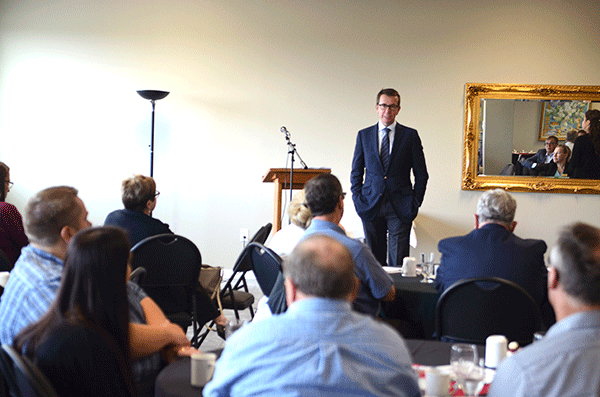
Prince Albert and northern Saskatchewan families account for over 20 per cent of all of Saskatchewan’s Canada Child Benefit dollars, according to data unveiled by Treasury Board president Scott Brison Tuesday.
Brison was in Prince Albert to make a $1.9 million funding commitment for Catholic Family Services, and to meet with members of the Prince Albert and District Chamber of Commerce.
In his prepared remarks delivered during the chamber luncheon, Brison said in the Prince Albert federal riding, almost $84 million goes to 10,650 families benefitting from the program, for about $7,900 per family. In the Desnethé-Missinippi-Churchill River riding, which encompasses all of northern Saskatchewan, the program provides almost $118 million per year to more than 11,000 families.
The Canada Child Benefit is a tax-free monthly payment made to eligible families to help them with the cost of raising children. The benefit was launched by the federal government two years ago, replacing existing benefits and tax credits. It’s calculated based on financial need.
“(Bank of Canada Governor Stephen Poloz) refers to this kind of thing as the marginal propensity to consume,” Brison said during his speech Tuesday.
“When you put more money in the pockets of people who need it the most, they spend it on things they need and their families need. It does help create economic activity and opportunity in small communities right across Canada.”
Brison also touted small business tax cuts and investments into agriculture research.
He then took a moment to talk about why reconciliation makes sense from an economic perspective.
“The fact is that if you have your youngest, fastest growing population in your country that is also your most economically disadvantaged and disenfranchised,” he said.
“That represents to us…one of the greatest risks we have both socially and economically. On the other hand, having a youthful population and a fast growing population has economic advantages, but only if they give them skills they need to participate fully in the economy and society.”
That’s why ensuring Indigenous education is properly funded and other inequalities removed is so important, Brison said, especially in Saskatchewan.
Here in Saskatchewan, by 2036, Statistics Canada estimated one in five people will be Indigenous,” he said.
“If you have one in five of your population who are economically disadvantaged and disenfranchised, that is a huge weight on your economy.”
Brison wrapped up his remarks by talking about NAFTA negotiations with the Americans.
He stressed the importance of trade, pointing out that last year, $16 billion in exports crossed the Canada-US border in Saskatchewan. He said the trade deal with Europe is an example of a diversifying global market for Canadian-made goods.
“But let’s be clear. NAFTA has been really important and really good for Canada, the United States and Mexico. Any artificial barrier to trade is bad for jobs in all three countries,” he said.
“The prime minister and minister Freeland have made it clear that in terms of dealing with tariffs… we will not escalate, but we will not back down. When we face illegal and unjust measures, we will respond. We understand these protectionist barriers are bad for jobs in all three countries.”

